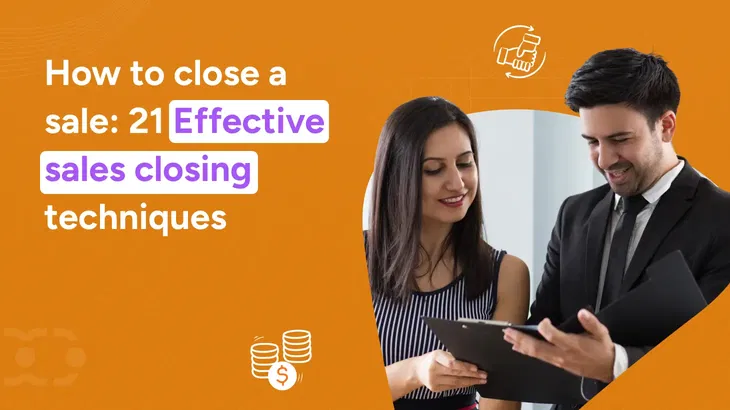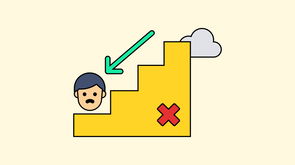1. Assumptive Close
The assumptive close involves acting as if the prospect has already decided to purchase. By projecting confidence, the salesperson subtly encourages the prospect to agree.
Example:
"When would you like us to schedule the installation?"
How to use it:
Build trust during the sales conversation, address all key points, and then naturally move into scheduling or confirming details. Ensure you’ve identified the decision maker and clarified objections beforehand.
Role-playing scenario:
Sales rep: "Once we deliver this, would you prefer email or text notifications for updates?"
Customer: "Text notifications, please."
Sales manager: "Great, let me finalize that for you."
2. Now or never close
This technique creates a sense of urgency by presenting a time-sensitive offer, compelling the prospect to act immediately.
Example:
"If you commit today, we can offer a 15% discount."
How to use it:
Highlight the value of acting immediately. Avoid sounding off-putting by being too pushy; instead, emphasize the benefits they’ll miss.
Role-playing scenario:
Sales rep: "This pricing is exclusive for orders placed by Friday—does this work for you?"
Customer: "Let me confirm with my team today."
3. Summary close
The summary close technique involves recapping the key benefits and agreed-upon points to reinforce the value proposition before asking for the sale. This helps the prospect see the comprehensive advantages of the deal.
Example:
"With this package, you’ll gain enhanced efficiency, 24/7 support, and free onboarding training."
How to use it:
Summarize the value proposition, aligning it with the prospect’s pain points, before asking for the sale.
Role-playing scenario:
Sales rep: "To summarize, this system automates 70% of manual tasks, saves you 15 hours weekly, and includes real-time analytics. Are we ready to proceed?"
4. Sharp angle close
When a prospect seeks a concession, the salesperson agrees, provided the prospect commits to the purchase.
Example:
"If we can meet that delivery date, will you be ready to place the order?"
How to use it:
Identify common objections in your sales pitch and prepare to address them with conditional agreements.
Role-playing scenario:
Customer: "Can you offer a faster shipping timeline?"
Sales rep: "If we ensure delivery in 3 days, can we finalize the purchase today?"
5. Puppy dog close
Allowing the prospect to try the product or service on a trial basis can reduce resistance and build trust, increasing the likelihood of a sale. This technique is particularly effective for products that require hands-on experience.
Example:
"Why not test the software for two weeks and see how it fits your needs?"
How to use it:
It works well for hands-on products or services. During the trial period, focus on building trust and keeping communication open.
Role-playing scenario:
Sales rep: "We’ll set you up with a 7-day trial at no cost. After that, we can review your feedback and finalize the deal."
6. Question close
Engaging the prospect with questions that lead them toward a positive buying decision can clarify any doubts and reinforce their interest.
Example:
"How do you see this solution helping your team streamline operations?"
How to use it:
Engage prospects in discussions that highlight the product’s benefits. Active listening is key to tailoring the conversation.
Role-playing scenario:
Sales rep: "What’s your biggest concern right now, and how can we resolve it for you?"
Customer: "Our delivery timelines."
Sales rep: "Our expedited services should address that perfectly—shall we proceed?"
7. Alternative choice close
Presenting the prospect with two or more options, all leading to a sale, can simplify the decision-making process.
Example:
"Would you prefer the standard package or the premium package with additional features?"
How to use it:
Focus on choices that lead to a purchase, ensuring each option aligns with the prospect’s needs.
Role-playing scenario:
Sales rep: "We offer monthly and annual subscriptions—which would you prefer?"
Customer: "The annual subscription seems better value."
8. Columbo close
Inspired by the TV detective, this technique addresses a critical point just as the meeting concludes, prompting the prospect to reconsider.
Example:
"One more thing—did I mention the free upgrades?"
How to use it:
Introduce a valuable point just as the conversation is about to close to re-engage the prospect.
Role-playing scenario:
Rep: "Oh, before we wrap up, I should mention that this plan includes quarterly performance reviews at no extra cost. Does that work for you?"
Buyer: "That’s fantastic. Let’s finalize the agreement."
9. Takeaway close
By suggesting that a particular feature or benefit may no longer be available, the salesperson can create a sense of loss, prompting the prospect to act.
Example:
"The complimentary training sessions are only available for clients who sign up this week."
How to use it:
Create urgency by suggesting that a benefit might no longer be available.
Role-playing scenario:
Rep: "If you sign up today, we can include the advanced training module for free. Otherwise, it’ll be part of a paid add-on."
Buyer: "Let’s proceed and lock that in."
10. Balance sheet close
Also known as the Ben Franklin close, this involves listing the pros and cons of the purchase to help the prospect visualize the benefits outweighing any drawbacks. This analytical approach appeals to logical decision-makers.
Example:
"Let’s weigh the benefits of moving forward against any concerns you have."
How to use it:
Help the prospect visualize the pros and cons, emphasizing how the benefits outweigh the drawbacks.
Role-playing scenario:
Rep: "Here are the key benefits of choosing our solution. Do any of these points address your concerns?"
Buyer: "Yes, this clarifies things. I’m ready to proceed."
11. Direct close
A straightforward approach where the salesperson directly asks for the sale.
Example:
"Are you ready to move forward with this purchase today?"
How to use it:
Ask for the sale directly with confidence and clarity. This approach works best when the prospect has no unresolved objections.
Role-playing scenario:
Rep: "We’ve covered everything you need to know. Are you ready to finalize the deal today?"
Buyer: "Yes, let’s move forward."
12. Indirect close
A subtler approach, the indirect close involves gauging the prospect's readiness without directly asking for the sale.
Example:
"How does this proposal align with your current needs?"
How to use it:
Use indirect language to gauge the prospect’s readiness to commit without explicitly asking for the sale.
Role-playing scenario:
Rep: "Based on our discussion, does this solution meet your expectations for improving efficiency?"
Buyer: "It definitely does. I think we’re ready to proceed."
13. Minor point close
The salesperson can build momentum toward closing the entire sale by getting the prospect to agree on a minor aspect of the deal.
Example:
"Do you prefer the product in black or white?"
How to use it:
Focus on small decisions to build momentum and guide the prospect toward the final purchase.
Role-playing scenario:
Rep: "Would you like us to set up your account today, or shall we start onboarding next week?"
Buyer: "Let’s set it up today."
14. Opportunity cost close
Highlighting the potential loss of benefits or savings if the prospect delays the decision can motivate prompt action.
Example:
"Delaying this decision could mean missing out on the current promotional pricing."
How to use it:
Emphasize what the prospect could lose by not acting now, such as a discount or additional benefits.
Role-playing scenario:
Rep: "Our current offer saves your team 20% on licensing costs, but it’s only available until Friday. Shall we secure it today?"
Buyer: "Yes, I don’t want to miss the savings. Let’s proceed."
15. Order blank close
The salesperson fills out the order form during the conversation, assuming the sale is imminent, which can prompt the prospect to proceed. This technique leverages the psychological principle of commitment.
Example:
"Let me start filling out your order form. Can I confirm your delivery address?"
How to use it:
Assume the sale and begin completing the paperwork, encouraging the prospect to move forward.
Role-playing scenario:
Rep: "I've noted the size of your team for the subscription. Can I confirm your billing details?"
Buyer: "Yes, here are the details. Let’s get started."
16. Suggestion close
Positioning the purchase as a suggestion rather than a decision can reduce pressure on the prospect.
Example:
"Many of our clients in your industry have found this solution extremely beneficial; perhaps it could work for you as well."
How to use it:
Position the sale as a helpful suggestion rather than a pressure-filled decision.
Role-playing scenario:
Rep: "I’d recommend starting with our mid-tier plan. It’s been a game-changer for companies like yours. How does that sound?"
Buyer: "That sounds like a good starting point. Let’s go ahead."
17. Silent close
After making the proposal, the salesperson remains silent, allowing the prospect to process the information and respond without feeling pressured. Silence can be a powerful tool in negotiations.
Example:
(After presenting the final proposal, the salesperson remains silent, letting the prospect decide.)
How to use it:
After delivering your pitch, resist the urge to fill the silence. Give the prospect space to process and respond.
Role-playing scenario:
Rep: "This package includes all the features we discussed. (pauses and waits)"
Buyer: "I think this works well. Let’s proceed."
18. Empathy close
Demonstrating understanding of the prospect's concerns and emphasizing how the product or service addresses those issues can build rapport and trust.
Example:
"I understand that budget constraints are a concern; that’s why we’ve tailored this solution to be cost-effective."
How to use it:
Address the prospect’s concerns with understanding and emphasize how the solution alleviates their specific challenges.
Role-playing scenario:
Rep: "I know scalability is important for your team. This plan grows with your needs while keeping costs manageable. Does that work for you?"
Buyer: "Yes, that’s exactly what we need. Let’s move forward."
19. Testimonial close
Sharing success stories or testimonials from satisfied customers can build credibility and reassure the prospect of the product's value. Social proof is a compelling motivator in decision-making.
Example:
"One of our clients in your industry achieved a 30% efficiency boost using this solution."
How to use it:
Share success stories or testimonials to build credibility and demonstrate real-world value.
Role-playing scenario:
Rep: "A similar-sized company in your field saw a significant improvement in their workflows after implementing this system. Would you like to see the case study?"
Buyer: "That’s reassuring. Yes, let’s proceed."
20. Future close
Encouraging the prospect to envision the future benefits of the product or service can create a positive outlook toward the purchase.
Example:
"Imagine how much time your team will save each week once this system is in place."
How to use it:
Help the prospect envision the future benefits of the purchase, creating a positive outlook.
Role-playing scenario:
Rep: "Picture your operations running seamlessly with automated updates and real-time insights. Does that align with your goals?"
Buyer: "Absolutely. I’m ready to move forward."
21. Trial close
Testing the prospect's readiness to buy by making a preliminary closing attempt can provide insight into their mindset and any remaining objections.
Example:
"If we could address that concern, would you be ready to proceed?"
How to use it:
Test the prospect’s readiness to buy by addressing objections and gauging their interest.
Role-playing scenario:
Rep: "If we include the integration support you mentioned, would that make this decision easier for you?"
Buyer: "Yes, that solves my concern. Let’s move forward."







Key takeaways
Closing a sale is the ultimate milestone in the selling process, where all your efforts as a sales professional culminate in a successful transaction.
In today’s world of competitive markets, knowing how to navigate the final stage of the sales cycle is essential.
Yet, mastering this critical stage can feel like a delicate yet decisive tightrope.
The right sales closing techniques can transform hesitant prospects into loyal customers, helping you close more sales deals while boosting customer satisfaction.
No matter your role—be it a sales rep, sales manager, or part of a larger sales team—these sales closing techniques examples will equip you with essential tools and insights.
They will help you tailor your approach, address the prospect’s pain points, and seal the deal.
Ready to learn how to close sales like a pro?
Discover the secrets behind successful sales closing deals, avoid common mistakes of sales closing, and turn promising leads into loyal customers.
This isn’t just about signing on the dotted line—it’s about creating a win-win situation for you and your potential customers.
Let’s dive in and explore sales closing tips that work for your product or service.
What is sales closing, and why is it important?
Sales closing refers to the final stage of the sales process, where a prospect transitions into a customer by agreeing to purchase a product or service.
It’s the moment when all your efforts—building rapport, addressing pain points, presenting the value proposition, and handling objections—culminate in a successful outcome.
In simpler terms, closing a deal in sales means securing the buyer's commitment to move forward with the transaction.
This stage is crucial because it directly impacts revenue and business growth. Successful sales closing techniques ensure higher customer satisfaction, a stronger sales pipeline, and a higher conversion rate of promising opportunities.
Mastering this skill helps sales reps close more deals, navigate various sales scenarios, and create long-term customer relationships.
Close deals smarter, not harder!
Discover how automation can help you close more deals and build stronger customer relationships.
21 Best sales closing techniques that deliver results
Mastering the right sales closing tips can distinguish between a lost opportunity and a sealed deal.
These proven strategies are designed to help you close more sales deals, build trust, and achieve consistent results across various sales scenarios.
1. Assumptive Close
The assumptive close involves acting as if the prospect has already decided to purchase. By projecting confidence, the salesperson subtly encourages the prospect to agree.
Example:
"When would you like us to schedule the installation?"
How to use it:
Build trust during the sales conversation, address all key points, and then naturally move into scheduling or confirming details. Ensure you’ve identified the decision maker and clarified objections beforehand.
Role-playing scenario:
Sales rep: "Once we deliver this, would you prefer email or text notifications for updates?"
Customer: "Text notifications, please."
Sales manager: "Great, let me finalize that for you."
2. Now or never close
This technique creates a sense of urgency by presenting a time-sensitive offer, compelling the prospect to act immediately.
Example:
"If you commit today, we can offer a 15% discount."
How to use it:
Highlight the value of acting immediately. Avoid sounding off-putting by being too pushy; instead, emphasize the benefits they’ll miss.
Role-playing scenario:
Sales rep: "This pricing is exclusive for orders placed by Friday—does this work for you?"
Customer: "Let me confirm with my team today."
3. Summary close
The summary close technique involves recapping the key benefits and agreed-upon points to reinforce the value proposition before asking for the sale. This helps the prospect see the comprehensive advantages of the deal.
Example:
"With this package, you’ll gain enhanced efficiency, 24/7 support, and free onboarding training."
How to use it:
Summarize the value proposition, aligning it with the prospect’s pain points, before asking for the sale.
Role-playing scenario:
Sales rep: "To summarize, this system automates 70% of manual tasks, saves you 15 hours weekly, and includes real-time analytics. Are we ready to proceed?"
4. Sharp angle close
When a prospect seeks a concession, the salesperson agrees, provided the prospect commits to the purchase.
Example:
"If we can meet that delivery date, will you be ready to place the order?"
How to use it:
Identify common objections in your sales pitch and prepare to address them with conditional agreements.
Role-playing scenario:
Customer: "Can you offer a faster shipping timeline?"
Sales rep: "If we ensure delivery in 3 days, can we finalize the purchase today?"
5. Puppy dog close
Allowing the prospect to try the product or service on a trial basis can reduce resistance and build trust, increasing the likelihood of a sale. This technique is particularly effective for products that require hands-on experience.
Example:
"Why not test the software for two weeks and see how it fits your needs?"
How to use it:
It works well for hands-on products or services. During the trial period, focus on building trust and keeping communication open.
Role-playing scenario:
Sales rep: "We’ll set you up with a 7-day trial at no cost. After that, we can review your feedback and finalize the deal."
6. Question close
Engaging the prospect with questions that lead them toward a positive buying decision can clarify any doubts and reinforce their interest.
Example:
"How do you see this solution helping your team streamline operations?"
How to use it:
Engage prospects in discussions that highlight the product’s benefits. Active listening is key to tailoring the conversation.
Role-playing scenario:
Sales rep: "What’s your biggest concern right now, and how can we resolve it for you?"
Customer: "Our delivery timelines."
Sales rep: "Our expedited services should address that perfectly—shall we proceed?"
7. Alternative choice close
Presenting the prospect with two or more options, all leading to a sale, can simplify the decision-making process.
Example:
"Would you prefer the standard package or the premium package with additional features?"
How to use it:
Focus on choices that lead to a purchase, ensuring each option aligns with the prospect’s needs.
Role-playing scenario:
Sales rep: "We offer monthly and annual subscriptions—which would you prefer?"
Customer: "The annual subscription seems better value."
8. Columbo close
Inspired by the TV detective, this technique addresses a critical point just as the meeting concludes, prompting the prospect to reconsider.
Example:
"One more thing—did I mention the free upgrades?"
How to use it:
Introduce a valuable point just as the conversation is about to close to re-engage the prospect.
Role-playing scenario:
Rep: "Oh, before we wrap up, I should mention that this plan includes quarterly performance reviews at no extra cost. Does that work for you?"
Buyer: "That’s fantastic. Let’s finalize the agreement."
9. Takeaway close
By suggesting that a particular feature or benefit may no longer be available, the salesperson can create a sense of loss, prompting the prospect to act.
Example:
"The complimentary training sessions are only available for clients who sign up this week."
How to use it:
Create urgency by suggesting that a benefit might no longer be available.
Role-playing scenario:
Rep: "If you sign up today, we can include the advanced training module for free. Otherwise, it’ll be part of a paid add-on."
Buyer: "Let’s proceed and lock that in."
10. Balance sheet close
Also known as the Ben Franklin close, this involves listing the pros and cons of the purchase to help the prospect visualize the benefits outweighing any drawbacks. This analytical approach appeals to logical decision-makers.
Example:
"Let’s weigh the benefits of moving forward against any concerns you have."
How to use it:
Help the prospect visualize the pros and cons, emphasizing how the benefits outweigh the drawbacks.
Role-playing scenario:
Rep: "Here are the key benefits of choosing our solution. Do any of these points address your concerns?"
Buyer: "Yes, this clarifies things. I’m ready to proceed."
11. Direct close
A straightforward approach where the salesperson directly asks for the sale.
Example:
"Are you ready to move forward with this purchase today?"
How to use it:
Ask for the sale directly with confidence and clarity. This approach works best when the prospect has no unresolved objections.
Role-playing scenario:
Rep: "We’ve covered everything you need to know. Are you ready to finalize the deal today?"
Buyer: "Yes, let’s move forward."
12. Indirect close
A subtler approach, the indirect close involves gauging the prospect's readiness without directly asking for the sale.
Example:
"How does this proposal align with your current needs?"
How to use it:
Use indirect language to gauge the prospect’s readiness to commit without explicitly asking for the sale.
Role-playing scenario:
Rep: "Based on our discussion, does this solution meet your expectations for improving efficiency?"
Buyer: "It definitely does. I think we’re ready to proceed."
13. Minor point close
The salesperson can build momentum toward closing the entire sale by getting the prospect to agree on a minor aspect of the deal.
Example:
"Do you prefer the product in black or white?"
How to use it:
Focus on small decisions to build momentum and guide the prospect toward the final purchase.
Role-playing scenario:
Rep: "Would you like us to set up your account today, or shall we start onboarding next week?"
Buyer: "Let’s set it up today."
14. Opportunity cost close
Highlighting the potential loss of benefits or savings if the prospect delays the decision can motivate prompt action.
Example:
"Delaying this decision could mean missing out on the current promotional pricing."
How to use it:
Emphasize what the prospect could lose by not acting now, such as a discount or additional benefits.
Role-playing scenario:
Rep: "Our current offer saves your team 20% on licensing costs, but it’s only available until Friday. Shall we secure it today?"
Buyer: "Yes, I don’t want to miss the savings. Let’s proceed."
15. Order blank close
The salesperson fills out the order form during the conversation, assuming the sale is imminent, which can prompt the prospect to proceed. This technique leverages the psychological principle of commitment.
Example:
"Let me start filling out your order form. Can I confirm your delivery address?"
How to use it:
Assume the sale and begin completing the paperwork, encouraging the prospect to move forward.
Role-playing scenario:
Rep: "I've noted the size of your team for the subscription. Can I confirm your billing details?"
Buyer: "Yes, here are the details. Let’s get started."
16. Suggestion close
Positioning the purchase as a suggestion rather than a decision can reduce pressure on the prospect.
Example:
"Many of our clients in your industry have found this solution extremely beneficial; perhaps it could work for you as well."
How to use it:
Position the sale as a helpful suggestion rather than a pressure-filled decision.
Role-playing scenario:
Rep: "I’d recommend starting with our mid-tier plan. It’s been a game-changer for companies like yours. How does that sound?"
Buyer: "That sounds like a good starting point. Let’s go ahead."
17. Silent close
After making the proposal, the salesperson remains silent, allowing the prospect to process the information and respond without feeling pressured. Silence can be a powerful tool in negotiations.
Example:
(After presenting the final proposal, the salesperson remains silent, letting the prospect decide.)
How to use it:
After delivering your pitch, resist the urge to fill the silence. Give the prospect space to process and respond.
Role-playing scenario:
Rep: "This package includes all the features we discussed. (pauses and waits)"
Buyer: "I think this works well. Let’s proceed."
18. Empathy close
Demonstrating understanding of the prospect's concerns and emphasizing how the product or service addresses those issues can build rapport and trust.
Example:
"I understand that budget constraints are a concern; that’s why we’ve tailored this solution to be cost-effective."
How to use it:
Address the prospect’s concerns with understanding and emphasize how the solution alleviates their specific challenges.
Role-playing scenario:
Rep: "I know scalability is important for your team. This plan grows with your needs while keeping costs manageable. Does that work for you?"
Buyer: "Yes, that’s exactly what we need. Let’s move forward."
19. Testimonial close
Sharing success stories or testimonials from satisfied customers can build credibility and reassure the prospect of the product's value. Social proof is a compelling motivator in decision-making.
Example:
"One of our clients in your industry achieved a 30% efficiency boost using this solution."
How to use it:
Share success stories or testimonials to build credibility and demonstrate real-world value.
Role-playing scenario:
Rep: "A similar-sized company in your field saw a significant improvement in their workflows after implementing this system. Would you like to see the case study?"
Buyer: "That’s reassuring. Yes, let’s proceed."
20. Future close
Encouraging the prospect to envision the future benefits of the product or service can create a positive outlook toward the purchase.
Example:
"Imagine how much time your team will save each week once this system is in place."
How to use it:
Help the prospect envision the future benefits of the purchase, creating a positive outlook.
Role-playing scenario:
Rep: "Picture your operations running seamlessly with automated updates and real-time insights. Does that align with your goals?"
Buyer: "Absolutely. I’m ready to move forward."
21. Trial close
Testing the prospect's readiness to buy by making a preliminary closing attempt can provide insight into their mindset and any remaining objections.
Example:
"If we could address that concern, would you be ready to proceed?"
How to use it:
Test the prospect’s readiness to buy by addressing objections and gauging their interest.
Role-playing scenario:
Rep: "If we include the integration support you mentioned, would that make this decision easier for you?"
Buyer: "Yes, that solves my concern. Let’s move forward."
How to enhance your sales closing?
Closing a sale requires more than just asking for the deal—it’s about addressing your prospect’s needs, building trust, and using the right strategies at the right time.
Here are key ways to improve your B2B sales closing techniques and close more deals effectively:
Say goodbye to missed opportunities!
Use Salesmate’s advanced CRM features to simplify your sales process and close deals faster than ever.
Most common sales closing objections
During the final stage of the sales process, prospects often raise objections that can stall or derail a deal. Understanding and addressing these objections is critical for sales experts to close more sales deals effectively.
Here are some of the most common objections and how to handle them:
By proactively addressing these objections, sales reps can turn resistance into promising opportunities, leading to successful sales closing deals.
Common sales closing mistakes to avoid
Closing a sale requires precision and strategy, but even experienced sales reps can make mistakes that hinder success. Avoiding these pitfalls is essential to ensure smooth and effective sales closing.
Here are the most common sales closing mistakes to steer clear of:
Avoiding these mistakes will help you close more deals, improve customer satisfaction, and build stronger relationships, ensuring long-term success in the sales cycle.
Win more deals stress-free.
With Salesmate, you can effortlessly streamline your sales process, track every deal, and boost your closing rate.
How can Salesmate help in sales closing?
Closing sales deals for one client can be easily done manually. However, in a growing company, multiple deals will progress parallelly.
In such a scenario, you need a sales CRM that can help you streamline your leads and close deals faster than ever!
Salesmate, a leading CRM solution, is designed to streamline the sales process and empower sales teams with tools that enhance efficiency, build relationships, and drive customer satisfaction.
Here’s how Salesmate can elevate your sales closing techniques and help you seal the deal effectively:
Turn every lead into a success story.
With Salesmate, manage your sales pipeline, address objections, and close deals with confidence.
Conclusion
Closing a sale is a critical skill that combines strategy, rapport-building, and adaptability. By mastering different closing techniques, addressing objections, and avoiding common mistakes, salespeople can close more deals and foster customer satisfaction.
Tools like Salesmate simplify the process, offering features like automated follow-ups, sales pipeline tracking, and AI-powered insights to streamline your efforts.
In today’s competitive market, success lies in showcasing the value of your product or service and guiding prospects confidently toward their purchase decision.
Apply these strategies, leverage tools like Salesmate, and watch your sales deals turn into long-lasting customer relationships.
Frequently asked questions
1. What are closing techniques in sales?
Closing techniques in sales are strategies used by sales professionals to finalize a deal and turn prospects into customers.
These techniques guide prospects through the decision-making process by addressing their pain points, highlighting the value proposition, and creating a sense of urgency.
2. How do you close a sales deal quickly?
To close a sales deal quickly:
Understand the prospect’s needs: Address their pain points with tailored solutions.
Create urgency: Use techniques like the now or never close to encourage immediate action.
Address objections proactively: Provide clear, solid answers to concerns.
Ask for the sale: Use direct or subtle approaches, like the summary close.
Leverage tools: Utilize CRMs like Salesmate to automate follow-ups and streamline communication.
3. What to do after closing a sale?
Thank the customer: Build rapport and reinforce the relationship.
Ensure smooth onboarding: Help the customer use the product or service effectively.
Follow up: Schedule check-ins to address questions or concerns.
Request feedback: Collect valuable feedback to improve the customer experience.
Maintain engagement: Share updates, offers, or check-ins to encourage repeat business.
Hinal Tanna
SEO SpecialistHinal Tanna is a SEO strategist and content marketer, currently working with the marketing team of Salesmate. She has a knack for curating content that follows SEO practices and helps businesses create an impactful brand presence. When she's not working, Hinal likes to spend her time exploring new places.